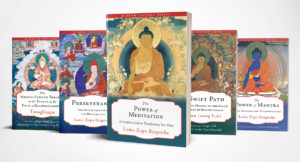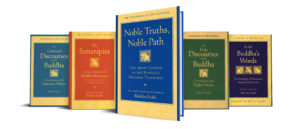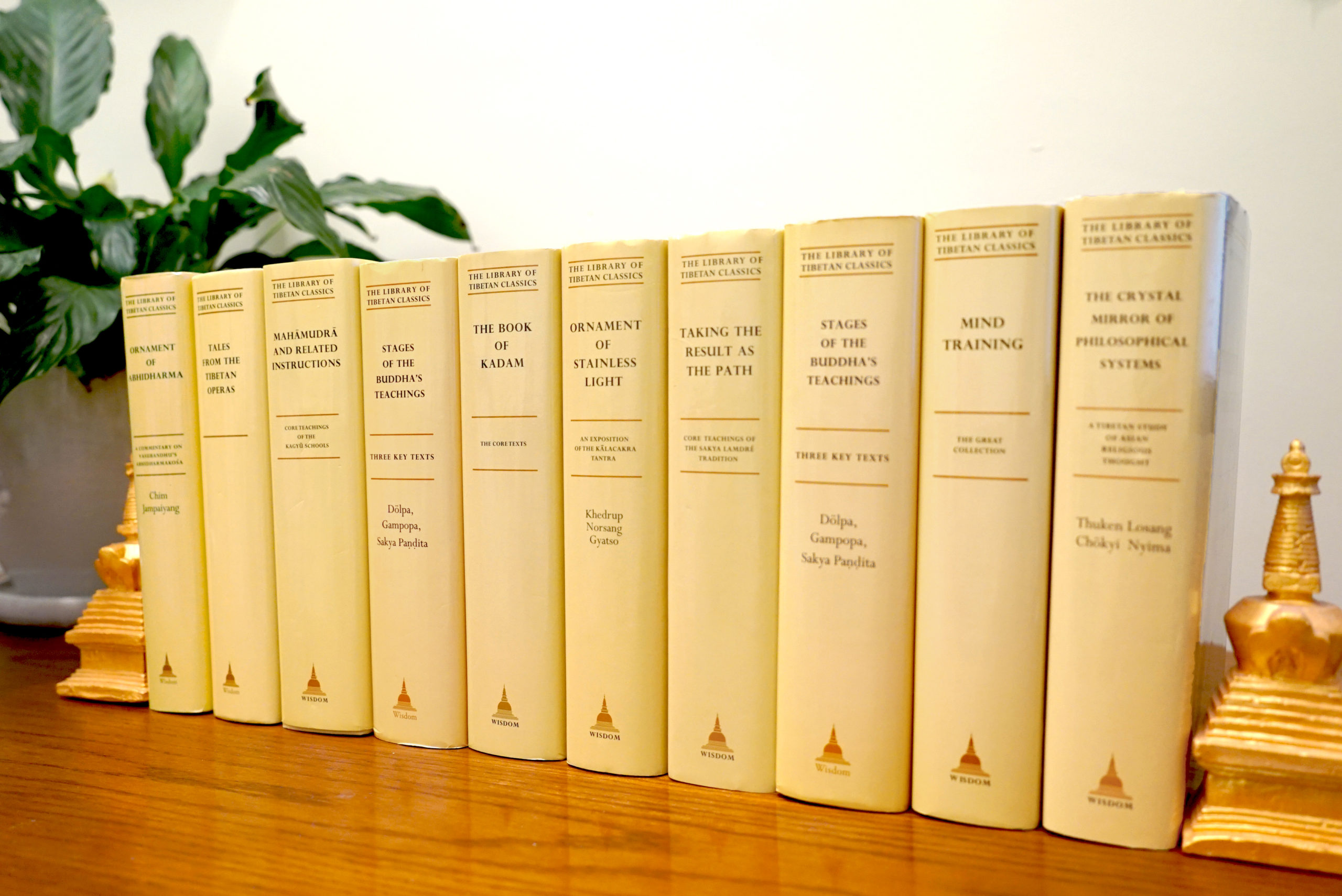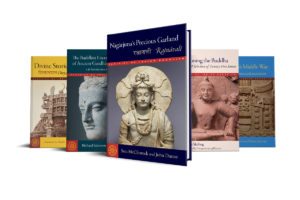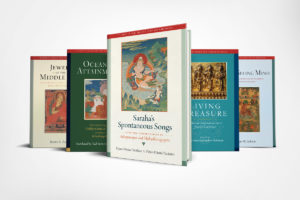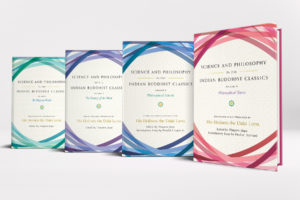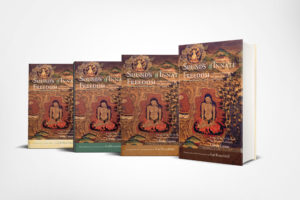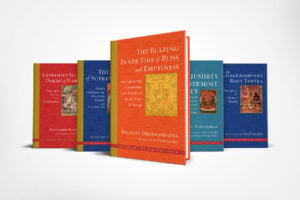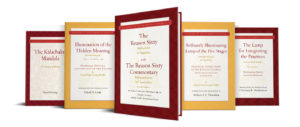
Wisdom Academics
Explore Wisdom’s Academic Series
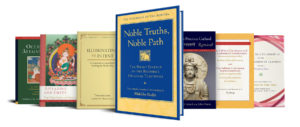 Explore Wisdom’s Academic Series
Explore Wisdom’s Academic Series
Wisdom has the joy and honor of publishing several series—some for 20+ years—that feature leading academic works and foundational translations. These academic series play an important role in Wisdom’s mission to promote and preserve Buddhist ideas, teachings, and practices from a diversity of countries and traditions.
Books in our Studies in Indian and Tibetan Buddhism and Classics of Indian Buddhism series are peer reviewed, and the series are overseen by editorial boards featuring leading scholars and translators.
Several books across our series are award-winners, including:
• Nāgārjuna’s Middle Way, Mark Siderits and Shōryū Katsura: 2014 Khyentse Foundation Translation Prize (Classics of Indian Buddhism series)
• Divine Stories: Divyāvadāna Part 2, Andy Rotman: 2018 Khyentse Foundation Prize for Outstanding Translation (Classics of Indian Buddhism series)
• A Lamp to Illuminate the Five Stages, Gavin Kilty: First Place, 2017 Tsadra Foundation Shantarakshita Award for Excellence in Translation (The Library of Tibetan Classics series)
• Mind Seeing Mind, Roger Jackson: 2020 Toshihide Numata Book Award in Buddhism (Studies in Indian and Tibetan Buddhism series)
Explore the series:
The Library of Tibetan Classics
The Library of Wisdom and Compassion
Studies in Indian and Tibetan Buddhism
Science and Philosophy in the Indian Buddhist Classics
The Dechen Ling Practice Series
Treasury of the Buddhist Sciences
Recent News
NOW AVAILABLE!
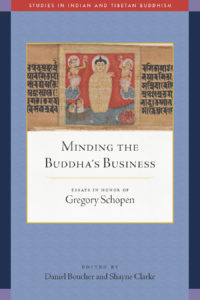 Minding the Buddha’s Business: Essays in Honor of Gregory Schopen
Minding the Buddha’s Business: Essays in Honor of Gregory Schopen
Daniel Boucher and Shayne Clarke
This volume honors the profoundly transformative influence of Schopen’s many contributions to Buddhist studies. Eighteen articles by former students and colleagues focus on the areas of Schopen’s most noteworthy influence: the study of the Mahayana, particularly of its early sutra literature; the study of Vinaya, especially the narratives accompanying the rules for monks and nuns; and the study of Buddhist epigraphy and art history. Contributors demonstrate the ongoing significance of Schopen’s scholarship, including his very first article, on the cult of the book in the early Mahayana, published fifty years ago.
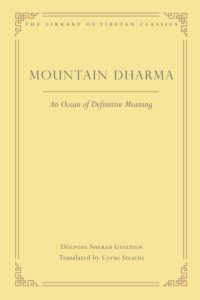 Mountain Dharma: An Ocean of Definitive Meaning
Mountain Dharma: An Ocean of Definitive Meaning
Cyrus Stearns
The controversial master Dölpopa Sherab Gyaltsen shook Buddhist Tibet when he taught that an eternal enlightened essence, or buddha nature, exists in full form in all living beings. The ideas discussed in Mountain Dharma are still as provocative as when Dölpopa first taught them, impacting Buddhism to this day. This volume is a brilliant annotated translation of Dölpopa Sherab Gyaltsen’s Mountain Dharma that opens a masterpiece of the Jonang tradition to Western readers and presents Dölpopa’s provocative ideas about a true, eternal, and established reality that still impact Buddhism today.
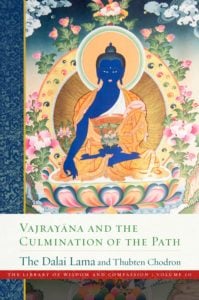 Vajrayāna and the Culmination of the Path
Vajrayāna and the Culmination of the Path
His Holiness the Dalai Lama and Thubten Chodron
The final volume of the Library of Wisdom and Compassion takes us to the uncommon practices and realizations of Vajrayāna and the culmination of the path to the full awakening of a buddha. His Holiness the Dalai Lama skillfully illuminates the unique qualities and complexities of Vajrayāna, as practiced in Tibet, and illuminates the method to eradicate the subtlest obscurations preventing the full awakening of a buddha. Speaking to newcomers and advanced students alike, he explains the similarities and differences of the Sūtra and Tantra paths. Having gathered many of the doubts and difficult points concerning the tantric path, he clarifies the purpose of receiving proper empowerment by qualified gurus and the ethical restraints and commitments required to enter the path of secret mantra.![]()
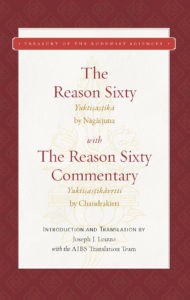 The Reason Sixty: With the Reason Sixty Commentary, Second Edition
The Reason Sixty: With the Reason Sixty Commentary, Second Edition
Joseph J. Loizzo
This volume contains English translations of two critical treatises of the Middle Way (Madhyamaka) Buddhist philosophical school: the Reason Sixty, by the most important of Indian thinkers Nāgārjuna (2nd century CE), and the commentary by his most influential successor, Chandrakīrti (7th century CE). These two treatises emphasize the non-foundationalist reasoning for which Madhyamaka thought is famed, here within the context of that quintessential Buddhist topic, universal compassion, thereby illuminating the nondual nature of these two fundamental components of Indian Buddhist thought.
About the Series
The Wisdom Culture Series
The Wisdom Culture Series is published by Wisdom Publications in association with the Foundation for the Preservation of the Mahayana Tradition (FPMT). Under the guidance of Lama Zopa Rinpoche, the series provides English-language readers with key works for the study and cultivation of the Mahayana Buddhist path, especially works of masters within the lineage of Lama Tsongkhapa and the Geluk school of Tibetan Buddhism. “Wisdom culture,” an expression frequently used by Lama Yeshe, is a Dharma culture rooted in wisdom and compassion. The Wisdom Culture Series is intended to support this vision by transmitting the timeless wisdom of the Dharma through authoritative and accessible publications.
Click here to visit the Wisdom Culture Series page.
The Wisdom Culture Series is published by Wisdom Publications in association with the Foundation for the Preservation of the Mahayana Tradition (FPMT). Under the guidance of Lama Zopa Rinpoche, the series provides English-language readers with key works for the study and cultivation of the Mahayana Buddhist path, especially works of masters within the lineage of Lama Tsongkhapa and the Geluk school of Tibetan Buddhism. “Wisdom culture,” an expression frequently used by Lama Yeshe, is a Dharma culture rooted in wisdom and compassion. The Wisdom Culture Series is intended to support this vision by transmitting the timeless wisdom of the Dharma through authoritative and accessible publications.
Teachings of the Buddha
Discover the best-selling series the Teachings of the Buddha. To ensure that the Buddha’s legacy would survive the ravages of time, his direct disciples compiled records of his teachings soon after his passing. In the Theravāda Buddhist tradition, which prevails in Sri Lanka and Southeast Asia, these records are regarded as the definitive “word of the Buddha.” Preserved in Pāli, an ancient Indian language closely related to the language that the Buddha spoke, this full compilation of texts is known as the Pāli Canon.
At the heart of the Buddha’s teaching were the suttas (Sanskrit sūtras), his discourses and dialogues. The suttas were compiled into collections called “Nikāyas,” of which there are four, each organized according to a different principle. The Dīgha Nikāya consists of longer discourses; the Majjhima Nikāya of middle-length discourses; the Saṃyutta Nikāya of thematically connected discourses; and the Aṅguttara Nikāya of numerically patterned discourses.
Many books in this series can be read in the Wisdom Reading Room. Click here to learn more.
Click here to visit the Teachings of the Buddha series page.
The Library of Tibetan Classics
The Library of Tibetan Classics is a major, exciting effort to support Tibetan culture. Edited by Thupten Jinpa— renowned scholar, author, translator, and interpreter for His Holiness the Dalai Lama—t The thirty-two-volume series, when complete, will span nearly a millennium and a half and will cover the entire expanse of Tibet’s classical literary heritage, from religion and folklore to art and poetry, from philosophy and psychology to medicine, and much more.
Many books in this series can be read in the Wisdom Reading Room. Click here to learn more.
Click here to visit the Library of Tibetan Classics series page.
The Library of Wisdom and Compassion
The Library of Wisdom and Compassion is a special multivolume series in which His Holiness the Dalai Lama shares the Buddha’s teachings on the complete path to full awakening that he himself has practiced his entire life. The topics are arranged especially for people seeking practical spiritual advice and are peppered with the Dalai Lama’s own unique outlook. Assisted by his long-term disciple, the American nun Thubten Chodron, the Dalai Lama sets the context for practicing the Buddha’s teachings in modern times and then unveils the path of wisdom and compassion that leads to a meaningful life and sense of personal fulfillment. This series is an important bridge from introductory to profound topics for those seeking an in-depth explanation from a contemporary perspective.
Click here to visit the Library of Wisdom and Compassion series page.
Classics of Indian Buddhism
The flourishing of Buddhism in South Asia during the first millennium of the Common Era produced many texts that deserve a place among the classics of world literature. Exploring the full extent of the human condition and the limits of language and reason, these texts have the power to edify and entertain a wide variety of readers. The Classics of Indian Buddhism series aims to publish widely accessible translations of important texts from the Buddhist traditions of South Asia, with special consideration given to works foundational for the Mahāyāna.
Several books in this series can be read in the Wisdom Reading Room. Click here to learn more.
Click here to visit the Classics of Indian Buddhism series page.
Studies in Indian and Tibetan Buddhism
This peer-reviewed series was conceived to provide a forum for publishing outstanding new contributions to scholarship on Indian and Tibetan Buddhism and also to make accessible seminal research not widely known outside a narrow specialist audience, including translations of appropriate monographs and collections of articles from other languages. The series strives to shed light on the Indic Buddhist traditions by exposing them to historical-critical inquiry, illuminating through contextualization and analysis these traditions’ unique heritage and the significance of their contribution to the world’s religious and philosophical achievements.
Many books in this series can be read in the Wisdom Reading Room. Click here to visit the Reading Room.
Click here to visit the Studies in Indian and Tibetan Buddhism series page.
Science and Philosophy in the Indian Buddhist Classics
Science and Philosophy in the Indian Buddhist Classics compiles classical Buddhist explorations of the nature of our material world, the human mind, logic, and phenomenology and puts them into context for the modern reader.
This ambitious four-volume series—a major resource for the history of ideas and especially the history of science and philosophy—has been conceived by and compiled under the visionary supervision of His Holiness the Dalai Lama himself. It is his view that the exploratory thinking of great Indian masters in the first millennium CE still has much that is of interest to us today, whether we are Buddhist or not. These volumes make those insights accessible.
Click here to to visit the Science and Philosophy in the Indian Buddhist Classics series page.
Sounds of Innate Freedom
Sounds of Innate Freedom: The Indian Texts of Mahāmudrā are historic volumes containing many of the first English translations of classic mahamudra literature. The texts and songs in these volumes constitute the large compendium called The Indian Texts of the Mahāmudrā of Definitive Meaning, compiled by the Seventh Karmapa, Chötra Gyatso (1456–1539). The collection offers a brilliant window into the richness of the vast ocean of Indian mahamudra texts cherished in all Tibetan lineages, particularly in the Kagyü tradition, giving us a clear view of the sources of one of the world’s great contemplative traditions.
Click here to visit the Sounds of Innate Freedom series page.
The Dechen Ling Practice Series
The Dechen Ling Practice Series from Wisdom Publications is committed to furthering the vision of David Gonsalez (Venerable Losang Tsering) and the Dechen Ling Press of bringing the sacred literature of Tibet to the West by making available many never-before-translated texts.
Click here to visit the Dechen Ling Practice Series page.
Treasury of the Buddhist Sciences
The Treasury of the Buddhist Sciences series is copublished by the American Institute of Buddhist Studies (AIBS) and Wisdom Publications in association with the Columbia University Center for Buddhist Studies and Tibet House US. AIBS established this series to provide authoritative translations, studies, and editions of the texts of the Tibetan Tengyur (bstan ’gyur) and its associated literature.
Click here to visit the Treasury of Buddhist Sciences series page.

